- Home
- Heather Graham
Lie Down in Roses Page 2
Lie Down in Roses Read online
Page 2
And there he found Lisette.
She leaned over the cradle, her head bowed within it, her hand trailed over it. Almost as if she were reaching to touch a child.
“Lisette!” He shouted no longer. There was no more need. It was a whispered prayer, a plea, a dread beseechment on the air. Tristan quailed inside, and he could not move. He froze, his hands clenched rigidly at his side.
He rushed forward.
She looked so peaceful there. Perhaps . . . and fell to his knees, taking her into his arms. Her head fell back and he saw the bruises at her throat, the trail of blood.
Like the swans, she had been butchered. Blood, blood, so much blood . . .
“Lisette!”
Now it was again a scream, a shriek of agony so deep that it burned his soul. Tristan held her, then clasped his poor dead wife to him, rocking her, rocking the tattered remnants of her youth and beauty.
Jon came upon him there. He watched in horror as his friend held Lisette, smoothed her hair, rocked her, as if she lived. Blood covered Tristan’s tunic and his cloak with its white ermine. Jon had never seen a man so demented with grief.
He was afraid to speak; and there was even more to tell Tristan.
And then Tristan spoke. Like a rasp, like the sound of steel against stone.
“What happened?”
“Tristan—”
“What happened here?”
Jon swallowed and spoke as evenly as he could. “Geoffrey Menteith lies wounded by the fire. They were attacked for no reason, with no warning. By men with no mercy. Our soldiers fought, well and bravely, yet they were overrun.” He couldn’t go on. He couldn’t tell Tristan the rest.
“Tell me what else was said!” Tristan roared. God in heaven, he sounded like a lion—wounded, vicious, terrible.
“Your father is also dead, Tristan. And—your brother. His wife. His ... infant son. All are ... slain.”
Tristan did not move; he did not blink. Warmth swamped him—sticky, horrible warmth. Lisette’s warmth, Lisette’s blood, her life. The life of their child not yet born, lost before she had succumbed to death herself,
There was a whimpering in the corner. Jon moved, for Tristan could not. Beneath a fallen wardrobe Jon found a young girl, Lisette’s handmaiden, cowering, sobbing now, eyes glazed with shock. Jon touched her, and she screamed and recoiled. Then she knew him as friend and flew into his arms, babbling incoherently. Before long, however, her sentences had become all too coherent
“Oh, oh my lords! Dear God! How my mistress screamed and screamed, and begged and pleaded for mercy!” sobbed the maid. “They caught her in the hallway and took her . . . by force . . . but rape was not enough! She pleaded on her knees, in tears, for her own life and for the child. They . . . they chased her here . . .”
Tristan turned his attention fiercely on the girl, and then he paused, swallowing sharply, lowering Lisette gently to the floor. What he saw next nearly broke him.
His child lay on the floor. But six months in the womb, born dead and yet perfect. A perfect boy. Fingers, toes, limbs, all fully formed.
Jon followed Tristan’s glance. “Oh, God,” he cried out. “Oh, God most Holy . . .”
Tristan set his miscarried child upon his slain wife, and cradled both tenderly in his arms. The girl began to talk again, in great bursts of terror.
“Hush!” Jon commanded, lest Tristan hear more. Jon was afraid. Afraid further when Tristan lifted Lisette and carried her tenderly through to his own chamber, laying her on the bed, kissing her on the forehead, as if she lived, leaving the baby beside her.
Jon paused but a moment to assure the girl that the assailants were gone. Then he chased after Tristan, who, with deadly purpose, was heading back down the stairs, down to Fielding. Fielding, receiving water from a woman who had returned from the forests where she had hidden, talked to Tristan.
“One of them said that ye’d not demand again to know about the Princes in the Tower, Lord Tristan. That Richard would be pleased with this day’s work.”
“My God!” Jon cried out in heedless horror. “The King would not order this carnage!”
Fielding eyed him wearily. “Like as not, yet a man with an urge to please him ...”
“When did they leave? Where did they ride?” Tristan demanded tersely.
Tristan should weep, Jon thought. No one can bear this grief. He should cry.
But the young widower—the new Earl of Bedford Heath—did not. He listened attentively to Fielding. And by then the men-at-arms from the northern boundaries of the property were flocking in, the wounded were beginning to walk about in their bandages. Tristan said nothing, but they were behind him when he turned. Outside, in the night air, more and more of the peasants and the craftsmen and the servants who had fled were returning. No order was given, for no words were needed. Horses and armaments began to appear in the courtyard, and in minutes a good-sized contingent—including many wounded men, had formed. Tristan needed only lift a hand, and they followed.
They caught up with the murderers—having followed the trail of the troop of mounted men—at midnight. Tristan’s forces were outnumbered, but this meant nothing. Tristan was an avenging angel; he was death incarnate. Sword and mace swung alike, in fury, with no fear. He had no care for personal safety, and men dropped in his path like felled trees.
At the end there were only prisoners, pathetic men who whined and cringed in fear, for in their hearts they knew they could ask no mercy. They refused to talk—until they saw Tristan’s face—and then they hastened to speak, swearing they had not touched his wife, nor slain his father or his brother.
Tristan leaned over one saying, “Who did this? Who ordered this?”
The slightest hesitation brought the answer.
“Sir Martin Landry, dead there, Lord Tristan, slain by your hand. Please, for the love of God, have mercy! He claimed that we were blessed by the King!”
Even then Tristan did not believe that Richard had ordered the attack. Richard might have wanted him chastised or reproached in some way. But not this slaughter of women and children. Still, Richard might well have ordered his own nephews slain. And though he might not have said, “Go out and do murder,” he might well have ordered the attack, and not have known what kind of scum he had sent to do his bidding.
Tristan turned his back on the men.
“What shall we do with them?” Jon asked. Thomas stood beside Jon, quiet, stiff. For with Tristan’s sister-in-law and brother he had found his own wife, the dear and charmless hag, the witty young woman who had given him his beautiful son, butchered and slain.
“Mercy!” screamed one of the men.
Tristan spun about. He could not bear the word.
But he had no chance to take action; Thomas had slain the man, who died, choking upon his own blood. Two men remained living. Tristan could not find it in his heart to grant mercy.
He breathed in deeply. “We will keep them prisoners until—”
One suddenly came to his knees at Tristan’s feet. “Slay me not! Drew there went into the house; Drew raped your wife! I ne’er touched her! He cast her over the cradle—”
The man broke off, noting something horrible in Tristan’s face. Tristan had realized that blood soaked the man’s front, and that he was not wounded. And if he had not attacked Lisette, how could he know that she lay over the cradle.
“I did not kill her, I did not kill her. Drew—”
Drew, the sniveling coward, cut in. “You liar, you were the first! The first to take her! Blame it on me! Nay, you—”
Tristan turned away; he wanted to disembowel them while they lived, to torture them slowly and surely. He had never known a feeling of such rage and sickness.
“They’re murderers, Tristan,” Jon said quietly. “Death is the penalty.”
Death was too easy, Tristan thought. But he swallowed and walked away, calling out over his shoulder, “Hang them.”
He heard no more. No pleas, no accusations. He rode sil
ently at the head of the men back to his home. Nay, manor, castle, property, holdings—but never home again.
Already the blood was being scoured away. The bodies of his kin were being cleaned by gentle hands, anointed by the priest. They would be laid to rest, masses would be said for their souls . . .
Jon and Thomas stayed with Tristan all night. He did not eat, he did not drink, he did not sleep, and he did not cry. The horror, the vengeance, brooded in him like a terrible storm.
At daybreak he kissed his father’s proud old cheeks, the same to his brother, his brother’s wife and child. He kissed poor Thomas’ ugly wife.
And Lisette . . .
Lisette he took in his arms, holding her tenderly, rocking her. Commanding that she be buried with their son, the child who had not lived to know his love.
He did not remain for the funerals. He left the place in Thomas’ hands; Jon would ride with him, Jon and his troops.
As day broke, Tristan had made a plan. He was going to Brittany, where Henry Tudor, the Lancastrian claimant, was gathering his forces and preparing to seize the Crown of England from Richard III.
Henry Tudor would be very glad to welcome him.
One
August 15th, 1485
“God’s blood!” Edgar swore, hurtling the message from his hands into the fire, then turning his wrath on the herald who had brought it. “You wish me to feed and succor a regiment of an army advancing to do battle with my King? Nay, man! Not if every stone in this castle were overturned! I shall be among the men who fight that Tudor upstart from the land and sea, young man! You tell your commander, this—this Lord de la Tere—what I have said. Never! Unless this castle were razed to the ground and the vultures left to pick my eyes! Go now!”
The messenger, by now an ashy gray, turned quickly. As he exited the keep gates, Edgar Llewellyn, Lord of Edenby Castle, gave his daughter a satisfied grin.
“Pity, daughter, that one cannot take arms against a messenger!” he said with mock wistfulness.
Genevieve, sitting before the great hearth in the hall, stroking the long ears of a large hound, exhaled softly. She glanced at her aunt, Edwyna, and her betrothed, Axel, before returning her father’s gaze.
“Father,” she proclaimed firmly, “let’s leave all as it is, shall we? The greatest dukes and earls and barons in the land are doing their best to remain uninvolved in this quarrel. ’Tis prudent, methinks, to keep quiet, and await—”
“Await!” Edgar cried, turning on her in passion. He was a tall man with blond hair barely graying and full of strength and vigor—but he knew his daughter would never tremble before him. Nor did she, as he ranted on. “What has become of loyalty? I swore an oath when Richard became King! I swore to support him at arms. And so, daughter, will I! In a few days’ time we will ride to meet the King—and we will fight the Tudor beast!”
Genevieve smiled sweetly and continued to scratch the dog’s ears, casting her fiance a quick glance of amusement. The young couple were both aware that she loved to tease her father.
“Father! Henry carries the red dragon of Wales as his standard! We go against—”
“Nay! Not even the Welsh lords have all sworn their fealty as yet, girl. And you cease this taunting of yours!”
Axel, staring into the fire at Genevieve’s side, caught her eye and winked, and she winked in turn. A tall, scholarly, beloved man, Axel spoke respectfully. “My Lord Edgar, your daughter, my fair betrothed, does have a wondrous point here. Why, sir! Think on Henry Percy, Earl of Northumbria! Great-grandfather slain in fighting against Henry IV. His father slain at Towton—and the earldom taken in attainder! In 1470 the property is restored. But, sir! Can you imagine why Percy is now for the House of Percy, no matter who should be King?”
“Percy will come to Richard. side!” Edgar stated.
“Ah, but will he fight?” Genevieve teased.
“God’s blood, little girl, but I never should have taught you to speak of politics!” Edgar complained. But he gazed at his sister Edwyna with an apologetic smile that belied his words. He was proud of Genevieve, his daughter and his only heir.
Edwyna, who could not have cared less about politics, smiled back vaguely and returned her attention to the tapestry she was weaving for her little daughter’s bedroom.
Genevieve had always found her aunt exotically beautiful. Not quite ten years Genevieve’s senior, she had been widowed young, and since the death of her husband had dwelt with her brother Edgar. Genevieve loved having Edwyna there; she was less a mother than a sister, a dear friend, and was always a bastion of peace.
“Hmmph!” Edgar snorted. “Henry Tudor my . . .”
“Edgar!” Edwyna remonstrated.
“Foot!” Edgar finished. He walked around to his daughter and patted her on the head; then he picked up a long tendril of her rich, golden hair, which was heavy and long enough to trail to the floor behind her when she sat. And her eyes . . . silver-blue like moonbeams, sparkling like stardust. His throat constricted, for she was so like her mother—the one woman he had ever loved, dead since Genevieve had been a child. Ah, and beauty is, he thought, as beauty does, for he knew she was all things he wished her to be—proud, kind, intelligent, and keenly aware of duty and loyalty.
He leaned over the back of her chair. “Genevieve,” he reminded her, “you came with me when I traveled to London to swear my oath of allegiance to Richard. Would you have me betray my word?”.
“Nay, Father,” Genevieve returned. “But ’tis true, most noble families mean to stay neutral in this battle. Father, should this thing continue many years more, there will be no nobility left!”
“That would be no problem to a new king,” Axel said dryly, “for the king would create new nobles.”
“The conversation,” Edgar murmured suddenly, “is moot, daughter. I have sworn to bear arms in King, Richard’s defense. My word is given, and I mean to uphold it. Axel, when the time comes, I shall lead the men of Edenby to join Richard’s service. You will, I assume, join me.”
Axel bowed in acquiescence. Edgar muttered something about Henry Tudor’s parentage that made them all grin, and then he quit the hall. Edwyna sighed and set her yarn upon the table to stretch, then announced that she was going to see to her five-year-old daughter, Anne. Thus were Axel and Genevieve smoothly given a few moments alone.
Genevieve watched her fiance’s face as he looked into the fire. She was fond of Axel, very fond. He tended to be soft-spoken and careful when he’d voice his views; Genevieve knew that he weighed matters with a grave intelligence. He was quick to smile, ready to listen to her and mull her opinions—a friend with whom. she could well imagine it comfortable to spend her lifetime. And he was a handsome knight, too, she thought proudly. His eyes were hazel and warm, his hair a dusty blond like wheat. Tall and straight and fair in features, a gentle man, a scholar, good with figures, wonderful in his gift with languages.
“You’re not easy with something,” Genevieve observed, watching his expression.
He shrugged unhappily. “I don’t like to say,” he murmured, glancing at Griswald, who had come from the kitchen to light the tapers in the hall. Genevieve rose with a soft rustle of her silk skirts and hurried to old Griswald, asking that he bring them some wine, then whispering with a sly wink that she would like to be alone with Axel.
Griswald brought the wine and discreetly left them alone. Axel and Genevieve sat down to the table, and she softly stroked the bronzed flesh of his hand, waiting for him to speak.
“I shan’t oppose your father, Genevieve,” he told her at last, sipping the fine, rich wine. “I, too, swore loyalty to Richard. But this matter of the young Princes troubles me deeply. How can one honor a King who would murder his own kin—children at that?”
“Axel, it is not proved that Richard caused the boys’ deaths,” Genevieve said, “nor, for that matter, is there proof that they are even dead.” She paused, remembering her meeting with Richard in London. She had been very impressed with h
im. Although a slight man, she’d found his face arresting, his eyes like magnets, reflecting the weight of the responsibility he carried. Richard, Genevieve was convinced, had not “seized” the throne. All of England had been up against the Woodvilles—the family of the “rightful” heir, his brother’s son. Men—including the merchants of England—had come to Richard begging him to take power, to restore law and order and commerce. Genevieve could not believe the grave man she had met in London capable of murder.
And her father was right. Like him, she had sworn her allegiance. She could not change that—not unless the King were verily proven a murderer to her.
“I wonder if we will ever know,” she murmured.
Axel shrugged, then caught her hand and turned it palm upward and drew a soft line upon it, smiling ruefully. “Nor does any of it really matter. Richard will remain King. Henry Tudor has landed, it is true, but not even the Welsh lords who promised their loyalty have all flocked to his standard. Richard’s forces will outnumber his nearly two to one.” He smiled. “We needn’t really talk about this. I don’t care to bore you—”
“You know that I am never bored with such discussion,” Genevieve corrected him primly, making him laugh.
“Neither am I, but as our banns have been cried and our nuptials approach, I had rather hoped that you would be wont to tease and taunt me with images of your gown. With—”
“It is silvery gray. And exquisite,” Genevieve told him simply, and added, “Edwyna has sewn in dozens and dozens of pearls, and I am quite sure you will never see anything so glorious in all your life.”
“Nay, but that’s a lie!”
“Most sincerely, it’s—”
He kissed her hand. “I do not dispute that the gown will be glorious. I say only that what lies beneath it will be far more glorious than any fabric, fur, velvet, or silk.”
Genevieve said softly “Oh!” then laughed, and kissed him quickly, telling him that he was capable of saying the most flattering things. They talked for several moments more, and she found herself thinking that it really was going to be such a good match. They liked one another, and he found it important to come to her with the things that weighed heavily on his mind. He would, of course, gain not only a bride but much property; yet Axel was a rich man himself. He approved of the fact that she knew the land so well—even though she would never totally relinquish to him what was her inheritance. Axel expected that they would rule their little world together, and Genevieve was keenly aware that another man might not have been so farsighted.

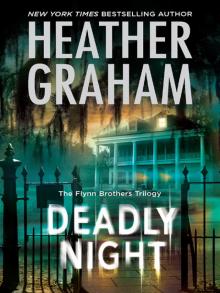 Deadly Night
Deadly Night The Uninvited
The Uninvited Dust to Dust
Dust to Dust Heart of Evil
Heart of Evil A Perfect Obsession
A Perfect Obsession The Keepers
The Keepers Pale as Death
Pale as Death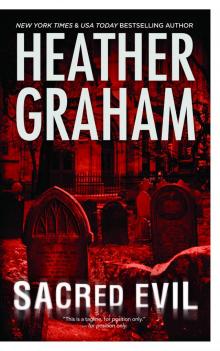 Phantom Evil
Phantom Evil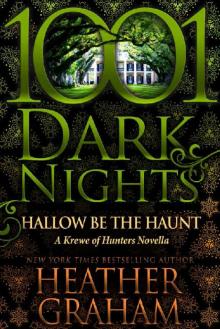 Hallow Be the Haunt
Hallow Be the Haunt Night of the Wolves
Night of the Wolves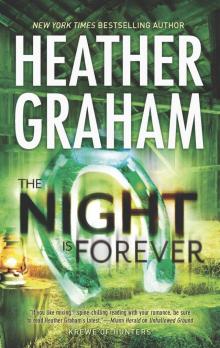 The Night Is Forever
The Night Is Forever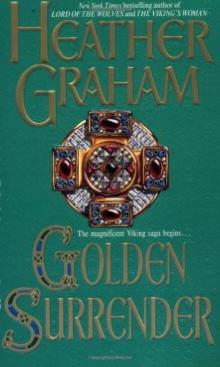 Golden Surrender
Golden Surrender Kiss of Darkness
Kiss of Darkness Beneath a Blood Red Moon
Beneath a Blood Red Moon A Dangerous Game
A Dangerous Game Ghost Shadow
Ghost Shadow Long, Lean, and Lethal
Long, Lean, and Lethal Fade to Black
Fade to Black The Rising
The Rising And One Wore Gray
And One Wore Gray Rebel
Rebel The Unseen
The Unseen The Night Is Watching
The Night Is Watching The Evil Inside
The Evil Inside The Unspoken
The Unspoken The Night Is Alive
The Night Is Alive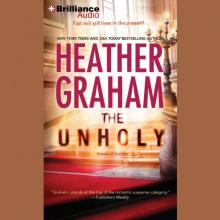 The Unholy
The Unholy Nightwalker
Nightwalker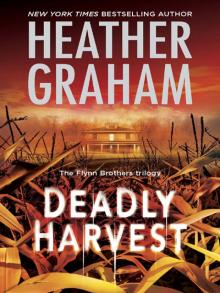 Deadly Harvest
Deadly Harvest An Angel for Christmas
An Angel for Christmas A Pirate's Pleasure
A Pirate's Pleasure American Drifter
American Drifter Realm of Shadows
Realm of Shadows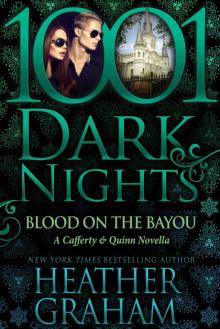 Blood on the Bayou
Blood on the Bayou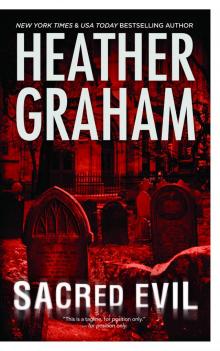 Sacred Evil
Sacred Evil Dying to Have Her
Dying to Have Her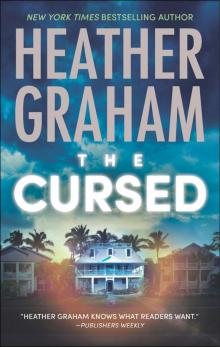 The Cursed
The Cursed Captive
Captive Hurricane Bay
Hurricane Bay Drop Dead Gorgeous
Drop Dead Gorgeous Ghost Memories
Ghost Memories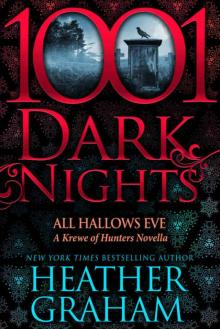 All Hallows Eve
All Hallows Eve Dying Breath
Dying Breath Deadly Fate
Deadly Fate The Dead Room
The Dead Room Lord of the Wolves
Lord of the Wolves Ghost Night
Ghost Night Ghost Walk
Ghost Walk The Forgotten
The Forgotten Unhallowed Ground
Unhallowed Ground One Wore Blue
One Wore Blue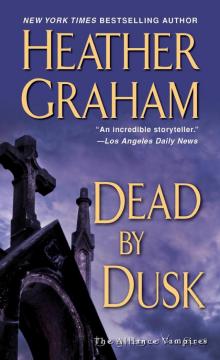 Dead By Dusk
Dead By Dusk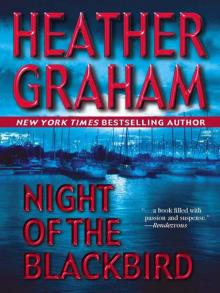 Night of the Blackbird
Night of the Blackbird The Dead Play On
The Dead Play On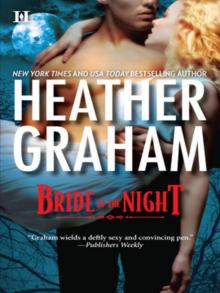 Bride of the Night
Bride of the Night Wicked Deeds
Wicked Deeds The Forbidden
The Forbidden Triumph
Triumph Out of the Darkness
Out of the Darkness Love Not a Rebel
Love Not a Rebel The Last Noel
The Last Noel Tall, Dark, and Deadly
Tall, Dark, and Deadly The Death Dealer
The Death Dealer Dead on the Dance Floor
Dead on the Dance Floor Law and Disorder
Law and Disorder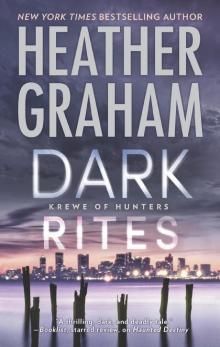 Dark Rites
Dark Rites New Year's Eve
New Year's Eve Hostage At Crystal Manor
Hostage At Crystal Manor And One Rode West
And One Rode West Home in Time for Christmas
Home in Time for Christmas Killing Kelly
Killing Kelly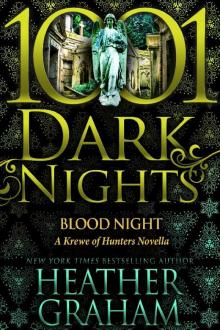 Blood Night
Blood Night Tangled Threat (Mills & Boon Heroes)
Tangled Threat (Mills & Boon Heroes)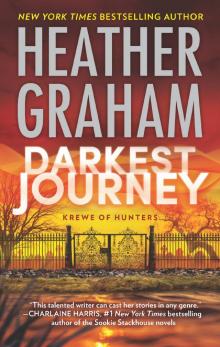 Darkest Journey
Darkest Journey Glory
Glory Deadly Touch
Deadly Touch An Unexpected Guest
An Unexpected Guest Night of the Vampires
Night of the Vampires Seize the Wind
Seize the Wind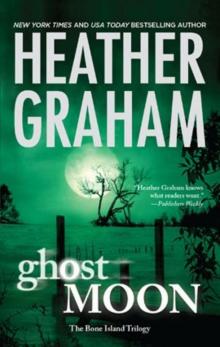 Ghost Moon
Ghost Moon The Vision
The Vision Dreaming Death
Dreaming Death Conspiracy to Murder
Conspiracy to Murder Horror-Ween (Krewe of Hunters)
Horror-Ween (Krewe of Hunters)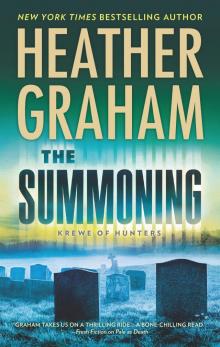 The Summoning
The Summoning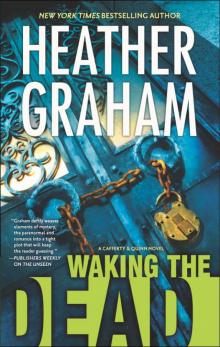 Waking the Dead
Waking the Dead Danger in Numbers
Danger in Numbers The Hidden
The Hidden Sweet Savage Eden
Sweet Savage Eden Tangled Threat ; Suspicious
Tangled Threat ; Suspicious Mother's Day, the Krewe, and a Really Big Dog
Mother's Day, the Krewe, and a Really Big Dog Picture Me Dead
Picture Me Dead The Killing Edge
The Killing Edge St. Patrick's Day
St. Patrick's Day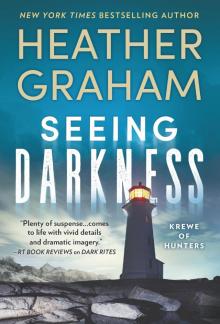 Seeing Darkness
Seeing Darkness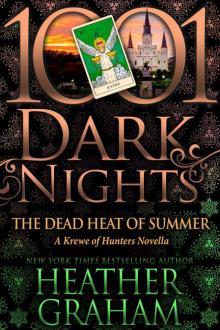 The Dead Heat of Summer: A Krewe of Hunters Novella
The Dead Heat of Summer: A Krewe of Hunters Novella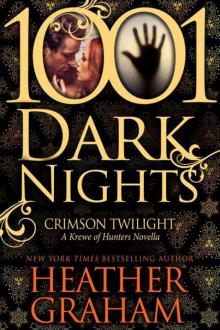 Crimson Twilight
Crimson Twilight Haunted Destiny
Haunted Destiny Devil's Mistress
Devil's Mistress Banshee
Banshee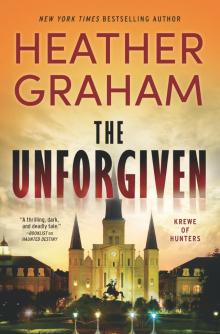 The Unforgiven
The Unforgiven The Final Deception
The Final Deception A Horribly Haunted Halloween
A Horribly Haunted Halloween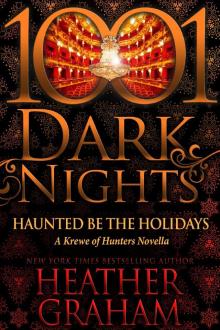 Haunted Be the Holidays
Haunted Be the Holidays Deadly Gift
Deadly Gift Easter, the Krewe and Another Large White Rabbit
Easter, the Krewe and Another Large White Rabbit Haunted
Haunted The Silenced
The Silenced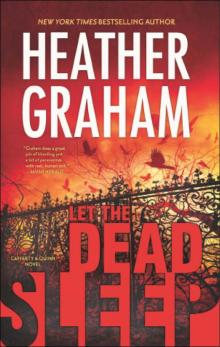 Let the Dead Sleep
Let the Dead Sleep Christmas, the Krewe, and Kenneth
Christmas, the Krewe, and Kenneth Big Easy Evil
Big Easy Evil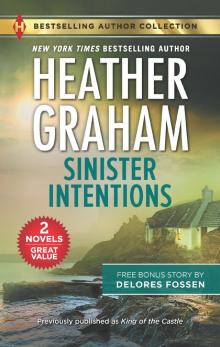 Sinister Intentions & Confiscated Conception
Sinister Intentions & Confiscated Conception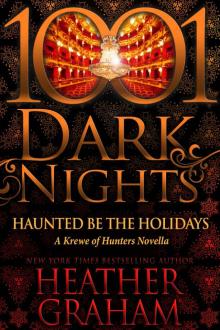 Haunted Be the Holidays: A Krewe of Hunters Novella
Haunted Be the Holidays: A Krewe of Hunters Novella Blood Red
Blood Red A Perilous Eden
A Perilous Eden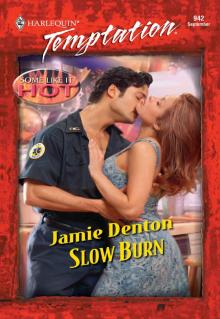 Slow Burn
Slow Burn Strangers In Paradise
Strangers In Paradise Bitter Reckoning
Bitter Reckoning Krewe of Hunters, Volume 1: Phantom Evil ; Heart of Evil ; Sacred Evil ; The Evil Inside
Krewe of Hunters, Volume 1: Phantom Evil ; Heart of Evil ; Sacred Evil ; The Evil Inside Do You Fear What I Fear?
Do You Fear What I Fear? The Face in the Window
The Face in the Window Krewe of Hunters, Volume 3: The Night Is WatchingThe Night Is AliveThe Night Is Forever
Krewe of Hunters, Volume 3: The Night Is WatchingThe Night Is AliveThe Night Is Forever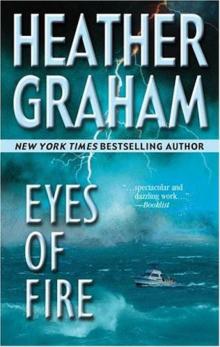 Eyes of Fire
Eyes of Fire Apache Summer sb-3
Apache Summer sb-3 Sensuous Angel
Sensuous Angel In the Dark
In the Dark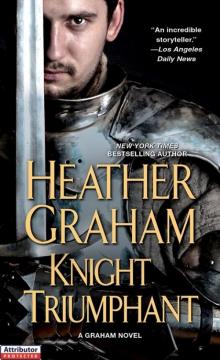 Knight Triumphant
Knight Triumphant Hours to Cherish
Hours to Cherish Tender Deception
Tender Deception Keeper of the Dawn tkl-4
Keeper of the Dawn tkl-4 Apache Summer
Apache Summer Between Roc and a Hard Place
Between Roc and a Hard Place Echoes of Evil
Echoes of Evil The Game of Love
The Game of Love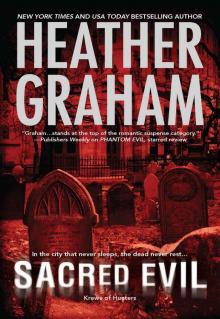 Sacred Evil (Krewe of Hunters)
Sacred Evil (Krewe of Hunters) Bougainvillea
Bougainvillea Tender Taming
Tender Taming Keeper of the Night (The Keepers: L.A.)
Keeper of the Night (The Keepers: L.A.) Lonesome Rider and Wilde Imaginings
Lonesome Rider and Wilde Imaginings Lucia in Love
Lucia in Love The Gatekeeper
The Gatekeeper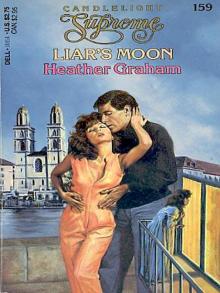 Liar's Moon
Liar's Moon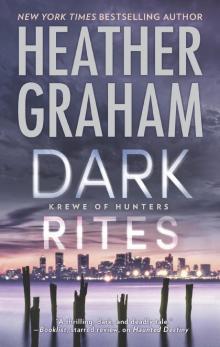 Dark Rites--A Paranormal Romance Novel
Dark Rites--A Paranormal Romance Novel A Season for Love
A Season for Love Krewe of Hunters, Volume 6: Haunted Destiny ; Deadly Fate ; Darkest Journey
Krewe of Hunters, Volume 6: Haunted Destiny ; Deadly Fate ; Darkest Journey Keeper of the Dawn (The Keepers: L.A.)
Keeper of the Dawn (The Keepers: L.A.)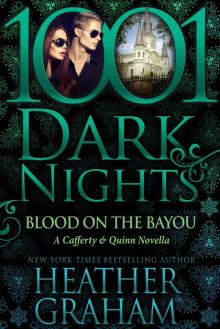 Blood on the Bayou: A Cafferty & Quinn Novella
Blood on the Bayou: A Cafferty & Quinn Novella Double Entendre
Double Entendre A Perfect Obsession--A Novel of Romantic Suspense
A Perfect Obsession--A Novel of Romantic Suspense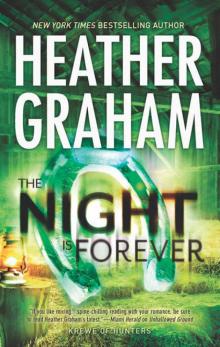 The Night Is Forever koh-11
The Night Is Forever koh-11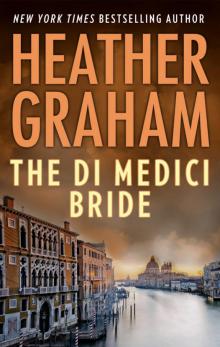 The Di Medici Bride
The Di Medici Bride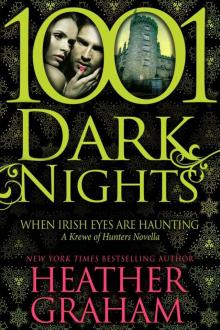 When Irish Eyes Are Haunting: A Krewe of Hunters Novella
When Irish Eyes Are Haunting: A Krewe of Hunters Novella The Keepers: Christmas in Salem: Do You Fear What I Fear?The Fright Before ChristmasUnholy NightStalking in a Winter Wonderland (Harlequin Nocturne)
The Keepers: Christmas in Salem: Do You Fear What I Fear?The Fright Before ChristmasUnholy NightStalking in a Winter Wonderland (Harlequin Nocturne) Never Fear
Never Fear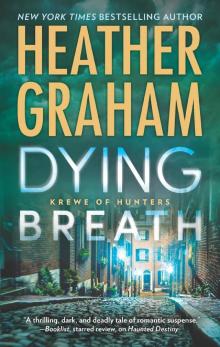 Dying Breath--A Heart-Stopping Novel of Paranormal Romantic Suspense
Dying Breath--A Heart-Stopping Novel of Paranormal Romantic Suspense If Looks Could Kill
If Looks Could Kill This Rough Magic
This Rough Magic Heather Graham's Christmas Treasures
Heather Graham's Christmas Treasures Hatfield and McCoy
Hatfield and McCoy The Trouble with Andrew
The Trouble with Andrew Never Fear - The Tarot: Do You Really Want To Know?
Never Fear - The Tarot: Do You Really Want To Know?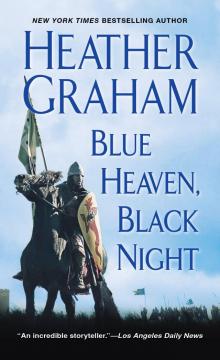 Blue Heaven, Black Night
Blue Heaven, Black Night Forbidden Fire
Forbidden Fire Come the Morning
Come the Morning Dark Stranger sb-4
Dark Stranger sb-4 Lie Down in Roses
Lie Down in Roses Red Midnight
Red Midnight Krewe of Hunters Series, Volume 5
Krewe of Hunters Series, Volume 5 Night, Sea, And Stars
Night, Sea, And Stars Snowfire
Snowfire Quiet Walks the Tiger
Quiet Walks the Tiger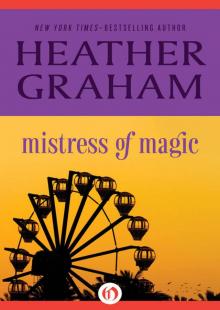 Mistress of Magic
Mistress of Magic For All of Her Life
For All of Her Life Runaway
Runaway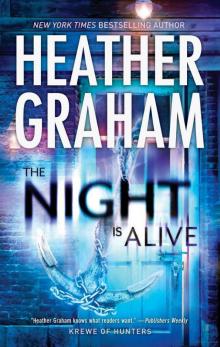 The Night Is Alive koh-10
The Night Is Alive koh-10 The Evil Inside (Krewe of Hunters)
The Evil Inside (Krewe of Hunters)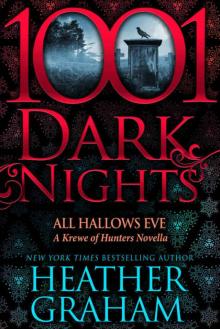 All Hallows Eve: A Krewe of Hunters Novella (1001 Dark Nights)
All Hallows Eve: A Krewe of Hunters Novella (1001 Dark Nights) Tomorrow the Glory
Tomorrow the Glory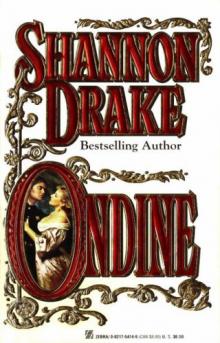 Ondine
Ondine Angel of Mercy & Standoff at Mustang Ridge
Angel of Mercy & Standoff at Mustang Ridge Bride of the Tiger
Bride of the Tiger When Next We Love
When Next We Love Heather Graham Krewe of Hunters Series, Volume 4
Heather Graham Krewe of Hunters Series, Volume 4 A Season of Miracles
A Season of Miracles Realm of Shadows (Vampire Alliance)
Realm of Shadows (Vampire Alliance) When We Touch
When We Touch Serena's Magic
Serena's Magic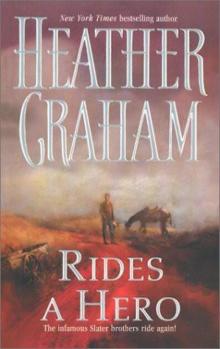 Rides a Hero sb-2
Rides a Hero sb-2 All in the Family
All in the Family Handful of Dreams
Handful of Dreams A Stranger in the Hamptons
A Stranger in the Hamptons Krewe of Hunters, Volume 2: The Unseen ; The Unholy ; The Unspoken ; The Uninvited
Krewe of Hunters, Volume 2: The Unseen ; The Unholy ; The Unspoken ; The Uninvited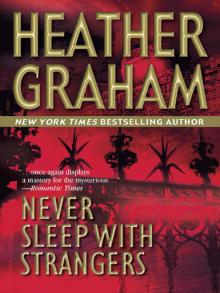 Never Sleep With Strangers
Never Sleep With Strangers Eden's Spell
Eden's Spell A Magical Christmas
A Magical Christmas Forever My Love
Forever My Love King of the Castle
King of the Castle Night Moves (60th Anniversary)
Night Moves (60th Anniversary) The Island
The Island Borrowed Angel
Borrowed Angel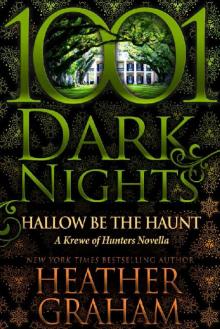 Hallow Be the Haunt: A Krewe of Hunters Novella
Hallow Be the Haunt: A Krewe of Hunters Novella Why I Love New Orleans
Why I Love New Orleans The Last Cavalier
The Last Cavalier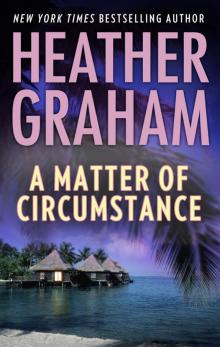 A Matter of Circumstance
A Matter of Circumstance Heather Graham's Haunted Treasures
Heather Graham's Haunted Treasures Tempestuous Eden
Tempestuous Eden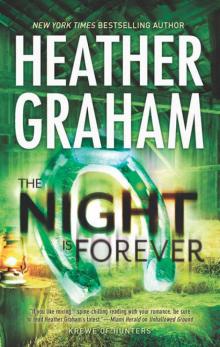 Krewe 11 - The Night Is Forever
Krewe 11 - The Night Is Forever